What Does Indecisiveness Mean?
Have you ever encountered a situation where you cannot make a choice? It could be what to eat, which movie to watch, or where to travel for vacation! Indecisiveness is the inability to select, which keeps us from reaching a conclusive decision. If you have ever had to work with a colleague who started every decision-making process with, “I’m not sure…”, you are already aware of the ramifications of indecisiveness at the workplace.
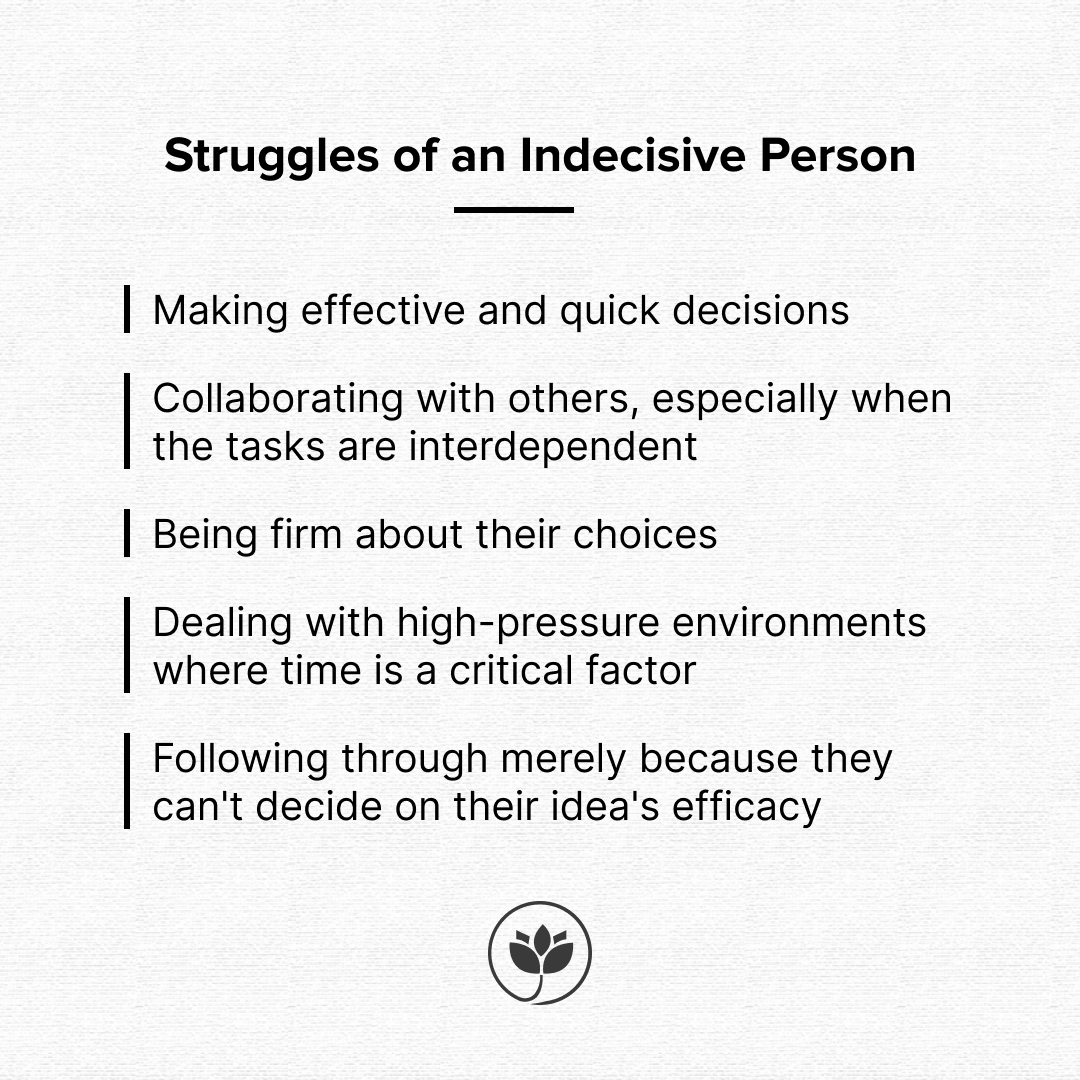
Causes of Indecisiveness – An Insight From Daily Life
Recall the last time you failed to make a decision. Now think about all the reasons you felt indecisive. Maybe it was a fear of disappointing others, hurting someone, simply failing, or even a lack of clarity about your purpose.
Indecision can stem from several factors that impact your cognitive ability to break the barrier.
- Fear of Failure
- Urge to people-please
- Lack of confidence
- Decision fatigue
- Analysis Paralysis
When you try to understand why you are being indecisive, you get closer to overcoming the problem. Nothing you cannot conquer if you put your mind to it. But before we explore how to stop being indecisive, let’s delve a little deeper into what triggers indecisiveness.
Anxiety and Indecision
While indecisiveness is terrible for your professional life, it can wreak havoc on your personal life. That is because chronic indecisiveness is a sign of a much deeper problem that often goes unaddressed – anxiety. Like depression, stress can make it difficult for people to make decisions, even those that seem insignificant to others. This indecisiveness is not intentional, and it is an effect of anxiety that leads to an extreme degree of frustration.
Anxiety can make you feel as if you are on a merry-go-round. Imagine standing in the middle of this fairground equipment and watching it spin rapidly.
It makes you dizzy and sick, but you still teeter to the edge, hoping to jump back into normalcy. Anxiety leaves you spinning with frustration and indecisiveness.
Why is indecisiveness an effect of anxiety?
Anxiety typically includes fear, apprehension, worry, dread, doom, nervousness, and danger. There are many types of anxiety disorders. Each has unique features, but all share various fears, worries, thoughts, feelings, and behaviors.
Constant concern, nervousness, and more take over your restless mind and keep it spinning in one place instead of allowing it to move forward. When it comes to decision-making, you tend to revolve with anxious thoughts like:
- What if?
- I’ll say something idiotic.
- I’ll do the wrong thing.
- Some awful thing may happen.
- I could have a panic attack in front of people.
- I might get trapped.
It can be challenging to live with anxiety and indecisiveness. But it’s important to note that it is only natural to feel this frustration with so many consequences to every choice.
Simple, effective ways to address indecisiveness when you are anxious.
What is worse for you – Being indecisive or the frustration that leads? If your answer is the latter, there are steps you can take to bring an end to the problem.
- Starting mindfully with small decisions can show significant improvement gradually and build your confidence to make bigger decisions.
- When reaching a decision, write down all the consequences you can think of – positive and negative. Note them down without judging your thoughts. Now, take a close look at your list and cross off the consequences that aren’t very realistic.
- For trivial things, try making decisions in a light-hearted way. Roll a dice, flip a coin, or draw straws. It will help lighten your mood and help you make a decision.
Anxiety and indecisiveness are a tightly knit combination. You can keep going in circles instead of moving forward. Though indecisiveness is a common sign of anxiety, you don’t have to live with this frustrating feeling forever.
Indecisiveness – Result of Inaction
In a restless state of mind, one finds it very difficult to be decisive. Some people suffer from pathological indecisiveness, a mental condition called aboulomania. It is typically associated with stress, anxiety, depression, and mental anguish and can severely impact one’s ability to function socially. Please note that even though many people suffer from indecision, it is rarely ever to the extent of obsession.
While I was trying to clarify why I am so indecisive, I found an interesting article about Shakespeare’s Prince Hamlet. He quintessentially overthought and did too little to solve the problem.
For those who are not familiar, Hamlet feels haunted by his father’s ghost, and he finds himself in a situation wherein order to find peace, he must kill his father’s murderer – his uncle Claudius. Unless the murder is avenged, Hamlet will continue to see apparitions of his father. So even though Hamlet knows what he has to do, he cannot decide when or how to do it – and that eventually becomes the tragic reason for his death. You can read the perspective on inaction from Hamlet’s story here.
Nalin Bhat shares,” I am flustered about my career and the choices I am taking on the same. I am troubled about whether am I gonna end up on a mediocre job and pay scale?
Questions like, what I can do to level up the game and increase my chances of a brighter future come to me. But I get no solid answer”. Read how Nalin feels paralyzed by indecision.
5-Step Plan to Overcome Indecisiveness
If you have recognized the reasons behind your inaction, you can finally try to learn how to overcome the problem of indecision. You can try some of these helpful tips for tackling the issue:
- Focus on What You Know and Where That Can Lead You
You are more likely to negate what you know because your indecisiveness offers you comfort. Next time you feel foggy on decision making, think about what you know to address the current situation. Information is powerful enough to nudge you in the right direction.
When you focus on available, relevant information, it streamlines the decision-making process. Rely on this structure to reach creative solutions.
- Communicate Your Concerns
Speaking with friends, family, or colleagues can boost your confidence and give you a proper sense of direction. When you feel lost, overwhelmed, or burdened by a particular choice, communicate your concerns as this is a feasible way to overcome these emotions. Those you trust can guide you on the right path, making it easier to make decisions.
- Step Out of Your Comfort Zone
An important method to overcome indecisiveness is to push yourself to do something that makes you uncomfortable. Something unusual or scary for you will force you to make better choices. Remember that we can overcome our weaknesses only when we challenge ourselves.
- Use Decision-Making Tools
Decision-making tools like SWOT Analysis or the Uncertainty Toolkit can help you decide without any doubts. The former is an acronym for strengths-weaknesses-outcomes-threats, while the latter is a mental model that helps make a hypothesis based on available data.
Make your toolbox to navigate decision-making challenges. You will find that it’s easier to move forward when you take it one step at a time.
- Try Not to Overthink the Results
You will feel miserable when you start doubting the outcomes. Focus solely on implementation instead of beating around the bush and overthinking the results – whether something will work or not. Once you roll out your ideas, look at them in action and recognize areas for improvement. Avoid fixating on whether you will win or lose because taking things one step at a time is a much more informed way of doing things and seeing them through to the end.
The trick is to change your perspective. Think of being indecisive as an opportunity to identify multiple ways of doing something. Being indecisive enables you to approach a problematic concern from different angles. You will be more confident in your decision-making abilities once you transition from uncertain to decisive.
Quotes on Indecisiveness
Vanessa Davis shares her blog post, Seven Little Things That Influence Your Consciousness, “Don’t be scared of emotions; after all, they won’t last forever, but they will return until you figure out what you need to learn from them.
Fighting the feeling gives it power since it draws attention to the problem and directs a lot of ‘fight or flight survival’ energy. You waste your energy by repressing it. You must rediscover the meaning of enjoyment in each moment and concentrate on the idea that whatever it has to offer at that time is something to be aware of and present.
Below are a few quotes on being indecisive, curated from the vast corners of the internet:
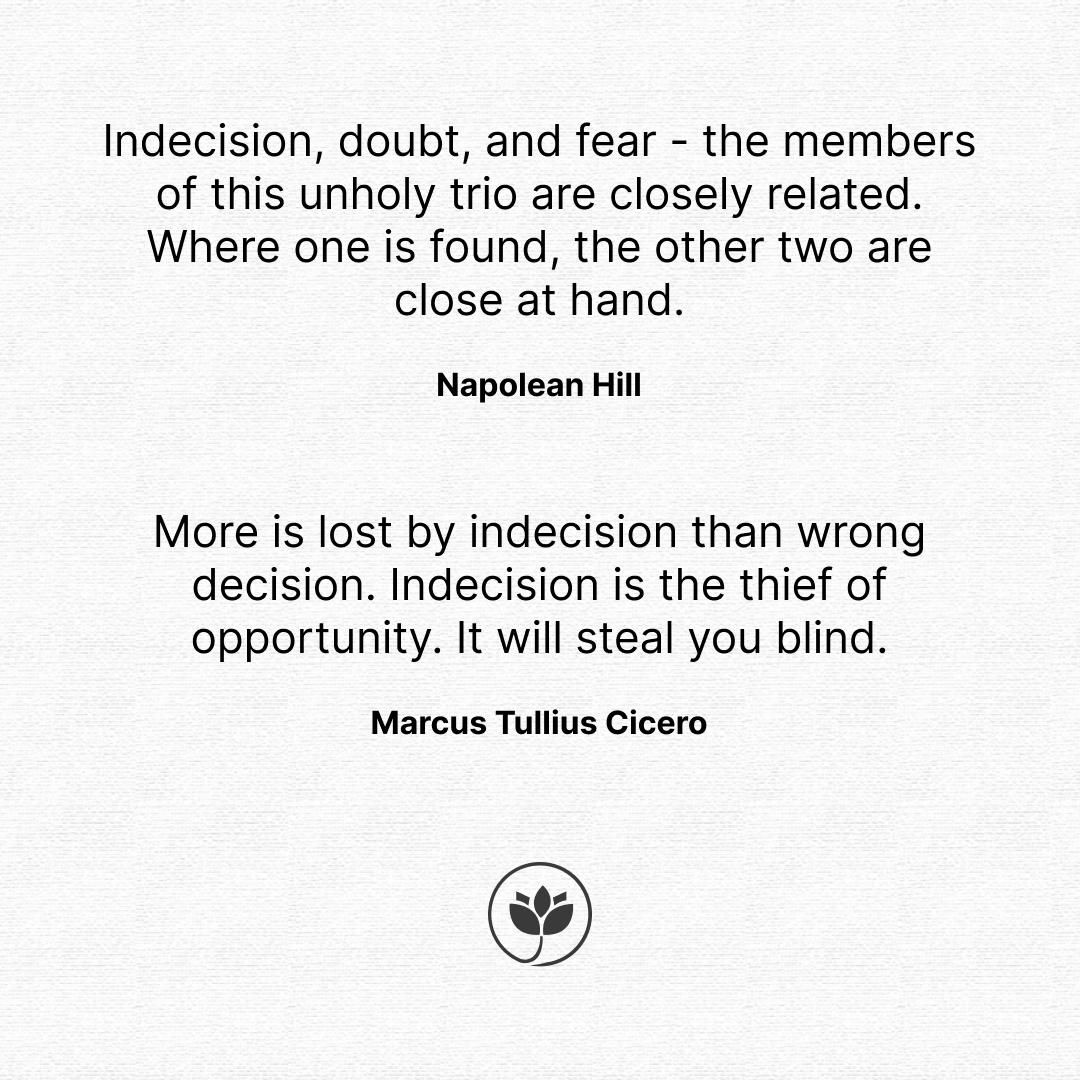
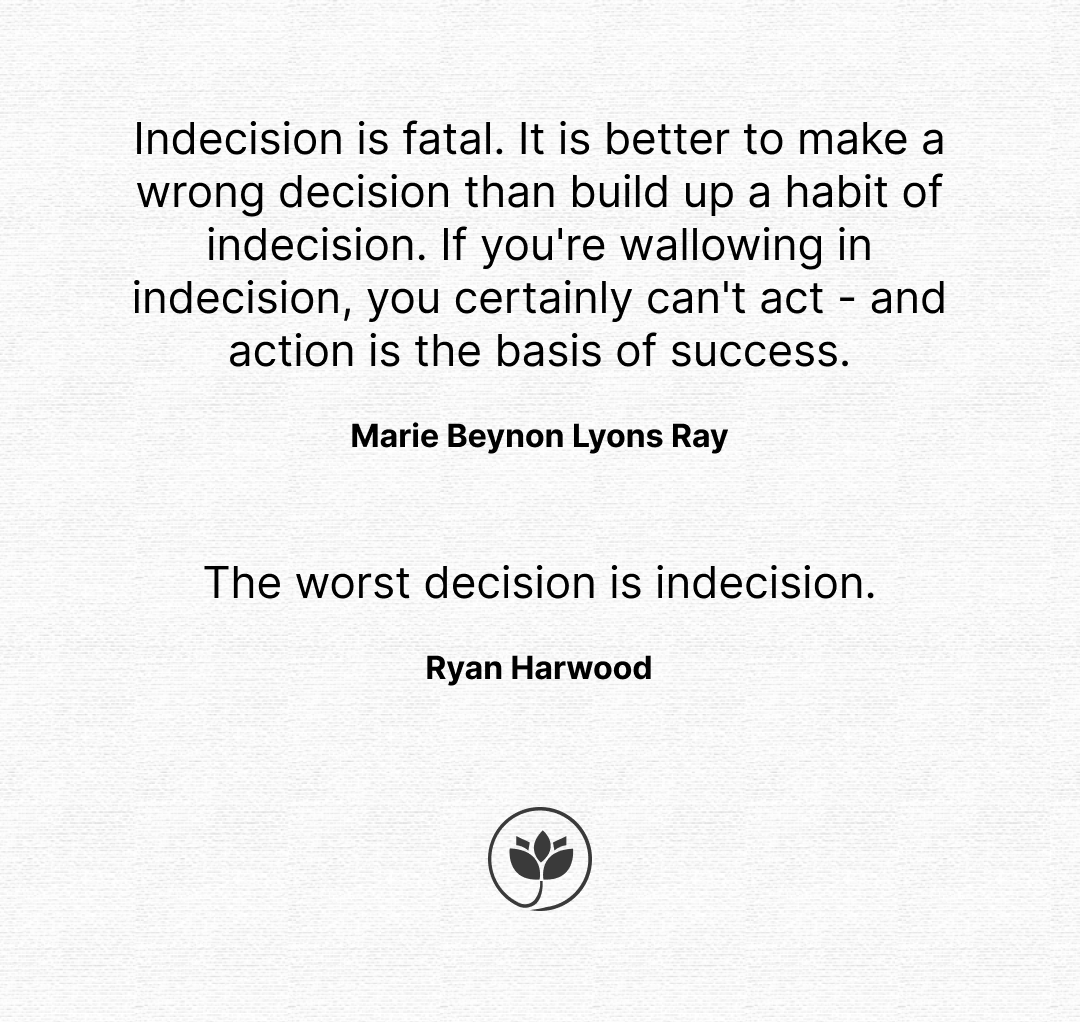
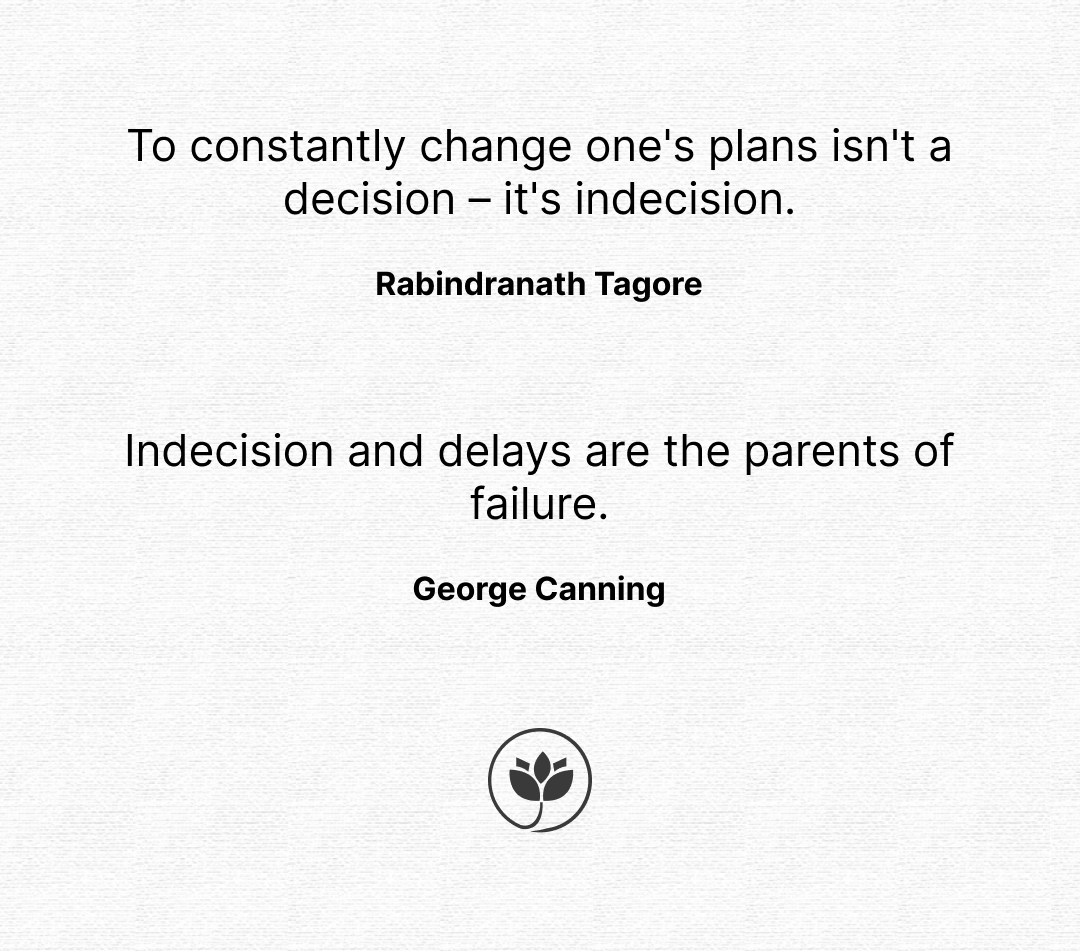
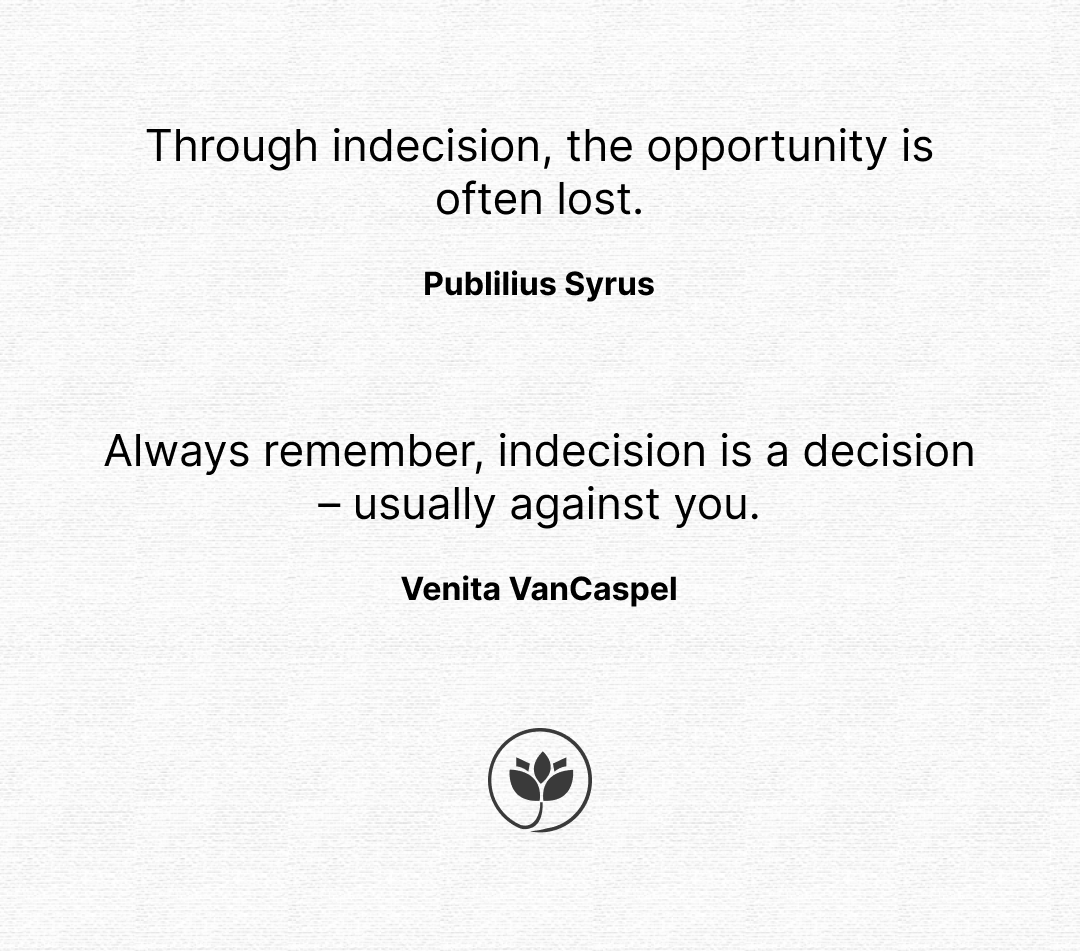
Books on Indecisiveness
Decision-making is one of the most crucial factors determining success and failure in our personal and professional lives. Making a decision requires selecting between two or more alternatives to reach the best outcome.
A decision is good when it is pragmatic, systematic, accountable, executable, and impacts others positively. Each of us needs to learn how to make a good decision because developing this skill takes a lot of time and factors in many considerations. Below are a few books that will help you improve your decision-making skills.
- Thinking, Fast and Slow by Daniel Kahneman
This book reveals when exactly to trust our intuitions and when exactly to think slowly. It offers enlightening and practical insights into making decisions and how we can apply other techniques to protect ourselves from the mental setbacks that keep us from making the right decisions.
- Blink: The Power of Thinking Without Thinking by Malcolm Gladwell
This book is about how we think without thinking – it’s about the choices that we make in an instant, in the blink of an eye. Blink reveals that good decision-makers are not necessarily those who process more information or spend more time thinking about something. Instead, those people have perfected filtering a few factors that matter from an overwhelming number of options. It helps you understand the different choices you make and changes how you think.
- Thinking in Bets: Making Smarter Decisions When You Don’t Have All the Facts by Annie Duke
The author of this book aims at teaching readers how to grow comfortable with unknown uncertainties and make better decisions despite not knowing it all. It focuses on teaching readers that you needn’t know it all if you want to make a decision. To avoid reactive emotions that may lead to bad choices, you must assess what you know and what you don’t know. It also teaches readers to be more compassionate, calm, and confident – qualities that act as catalysts for sound decision-making.
- Don’t Overthink It: Make Easier Decisions, Stop Second-Guessing and Bring More Joy to Life by Anne Bogel
This book reads how to overcome repetitive negative thoughts that are unhelpful and unhealthy. It provides strategies that can help you make both big and small decisions. It makes you get more comfortable with your choices by guiding you on using the right amount of energy while still focusing on what matters in your life.
- The Art of Thinking Clearly by Rolf Dobelli
This book is about avoiding perceptual errors that keep us from making good decisions in our life. It offers detailed information on recognizing them while also showing ways to prevent them. You have to think, free your mind, and focus on what matters to avoid cognitive errors while making decisions. This book helps readers understand how much damage mental errors can cause to the choices we make in our day-to-day lives.
Frequently Asked Questions
Why am I so indecisive?
If you suffer from indecisiveness, please understand that it is a kind of a mental shortcoming – a weakness of sorts. Those who delay their decisions are usually afraid of making choices. When it comes to decision-making, there is a false notion that the longer you wait, the better it will be.
While you shouldn’t become impulsive, it isn’t wise to wait forever. However, the good news is that decision-making is a skill you can develop over time. You can read more on how to overcome indecisiveness by improving decision-making skills.
How to help someone with indecisiveness?
Helping a friend or a family member with indecisiveness can be tricky. You don’t want to hurt them or offend them. I am sharing an article here that defines help in four steps.
How do you calm a restless mind?
A restless mind will make it more difficult to reach effective decisions. To make good decisions, we need to understand how to quieten the restlessness in our minds. A mind cluttered with thoughts manifest in the form of different conversations. You can read about what to do when the mind is restless?

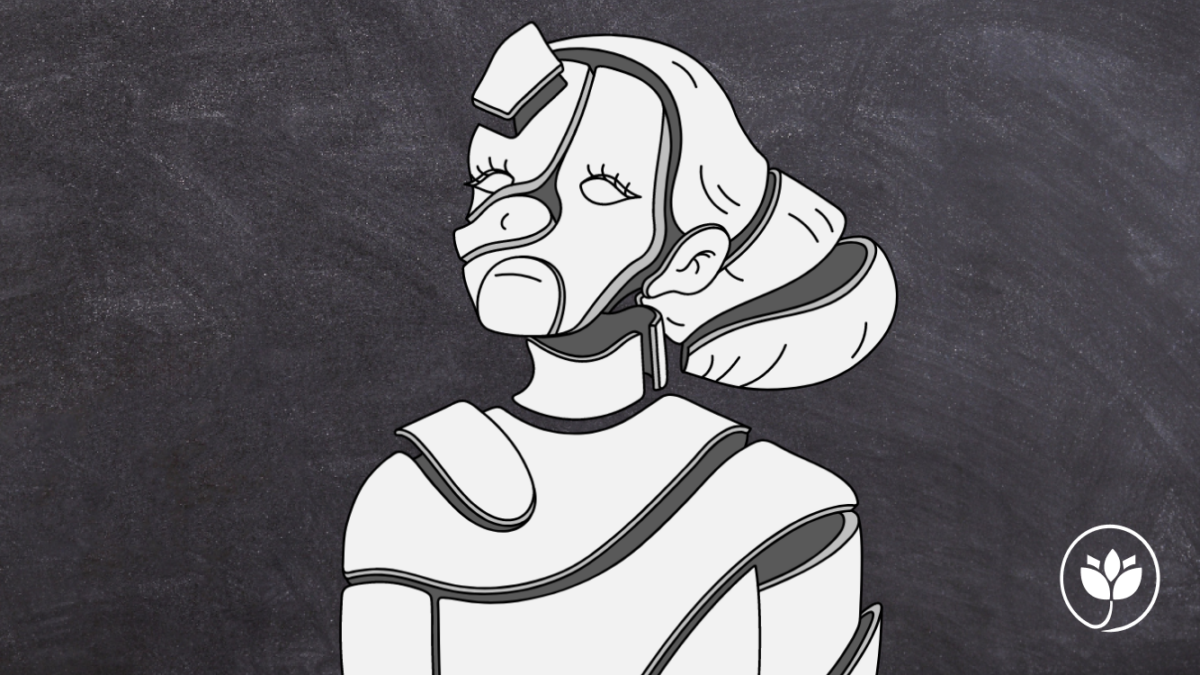







Comments & Discussion
1 COMMENTS
Please login to read members' comments and participate in the discussion.